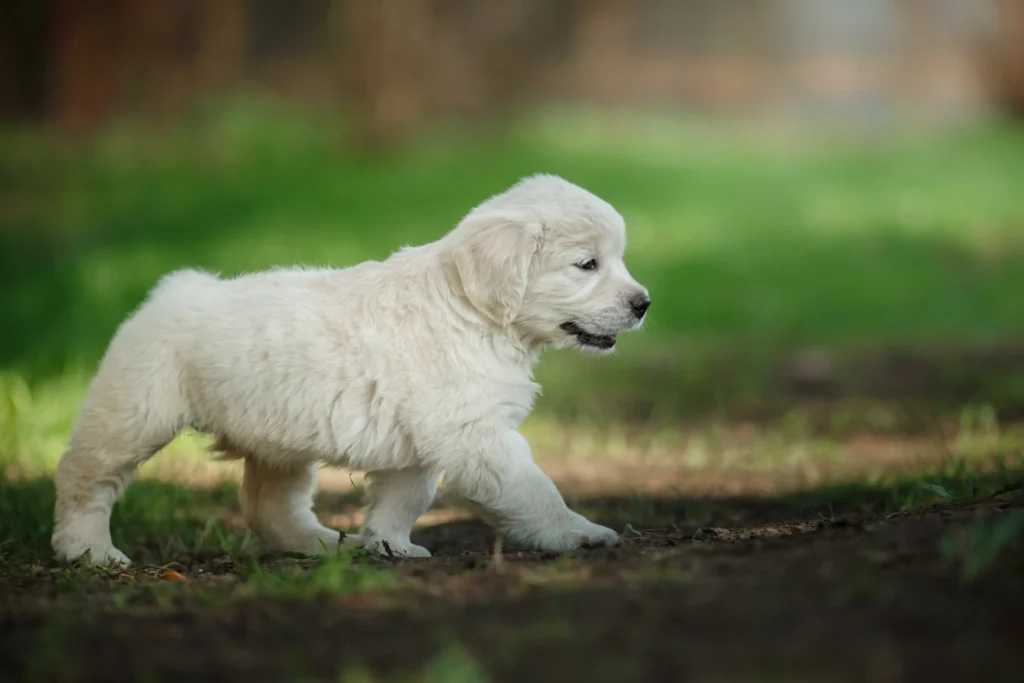The procedure of adopting a puppy for a household offers a joyful and exciting experience, but extensive planning is required for a successful transition.
These energetic, playful dogs need a place that offers comfort and safety so they can explore and thrive.
You can take a few actions prior to your new companion’s arrival, from what they eat, play with, and where to sleep.
In addition to keeping your puppy safe, planning helps your Golden Retriever form positive behaviors from a tender age, which eases the transition time for both of you.
Essential Supplies
Before your furry buddy comes, you should stock up on important essentials. Some of these items include a robust kennel for their secure refuge, comfy bedding for cuddly naps, high-quality food, and a plethora of chew toys to keep their active brains entertained.

Here comes the king of the house!
Remember to include a collar, leash, and harness for outings, as well as training goodies to reinforce good conduct. For those unavoidable spills, keep pet-friendly cleaning tools and plenty of patience handy. All these necessities can help make the adoption process easier for both of you.
Establish a Safe Atmosphere
A secure and engaging environment is ideal for you a puppy to grow into a lively and energetic adult. Protect their health and wellbeing by stashing away tiny things, cleaning supplies, and prescription drugs in secured cupboards or drawers. Eliminate any toxic or possibly harmful plants from their play routes. Install safety gates to keep your dog out of areas that might be dangerous, such as the garage or the stairs. Finally, if you want to provide a safe space for your pet to play and explore outside, think about fencing your yard.
Potty Training
Because of their intelligence and great desire to please, this dog breed learn things fast. Nevertheless, consistent and encouraging reinforcement is important for a toilet training program to be effective. Create a dedicated toilet space before bringing your dog home, preferably a calm, convenient place. Invest in top-notch puppy pads or set aside a space outside. Look at positive methods of reinforcement, including giving your dog treats or encouragement when they take a call in the designated area. Maintain regular walking and feeding routine as well to assist your puppy in developing dependable bowel habits. Being organized and patient can help you lay a solid basis for your puppy’s potty training.
Guidelines for Feeding
Puppies have unique dietary demands, which may be satisfied by feeding them high-quality puppy food. As they develop the amount of food required should be changed in accordance with the guidelines on the food packaging. Providing fresh water is also necessary at all times as it helps with digestion. Furthermore, stay away from overfeeding as it might result in obesity. For individualized guidance on feeding schedules and quantity amounts, consider the puppy’s age, weight, and activity level by speaking with your veterinarian.
Socializing and Training
It is important to think about your Golden Retriever puppy’s training and socialization requirements when getting your house ready for their arrival. Establish a secure, puppy-proof environment first, making sure that all possible risks are eliminated. Make time for regular outside playing and walks to expose them to a variety of sights, sounds, and sensations. Consider signing up for puppy training lessons to teach your puppy basic obedience instructions and socialize them with humans and other dogs. The secret to effective training is consistent, positive reinforcement. Remember that your dog’s future behavior will be strongly shaped by socializing and training them early.
Vet Visit and Healthcare
Begin by scheduling a full wellness assessment soon after introducing your puppy to a new home. This first appointment will create a foundation for your puppy’s health and allow your veterinarian to provide essential vaccines or address any problems. Ensure you have a schedule for vaccination to keep track of your puppy’s vaccines. In addition, discuss with your vet about preventative care measures like flea, heartworm, or tick prevention. Remember to schedule follow-up appointments as indicated and set aside funds for veterinary expenditures to ensure you are financially prepared for unforeseen healthcare requirements.
It is crucial to prepare your house for a new puppy, especially during their arrival as it helps them blend in with the new environment. Establishing a safe and hospitable space with designated zones for training, play, and sleeping helps create the foundation for a contented and well-mannered puppy. Making an effort to puppy-proof your space and purchasing required products will enable you to start out well and build a strong, lasting relationship.
